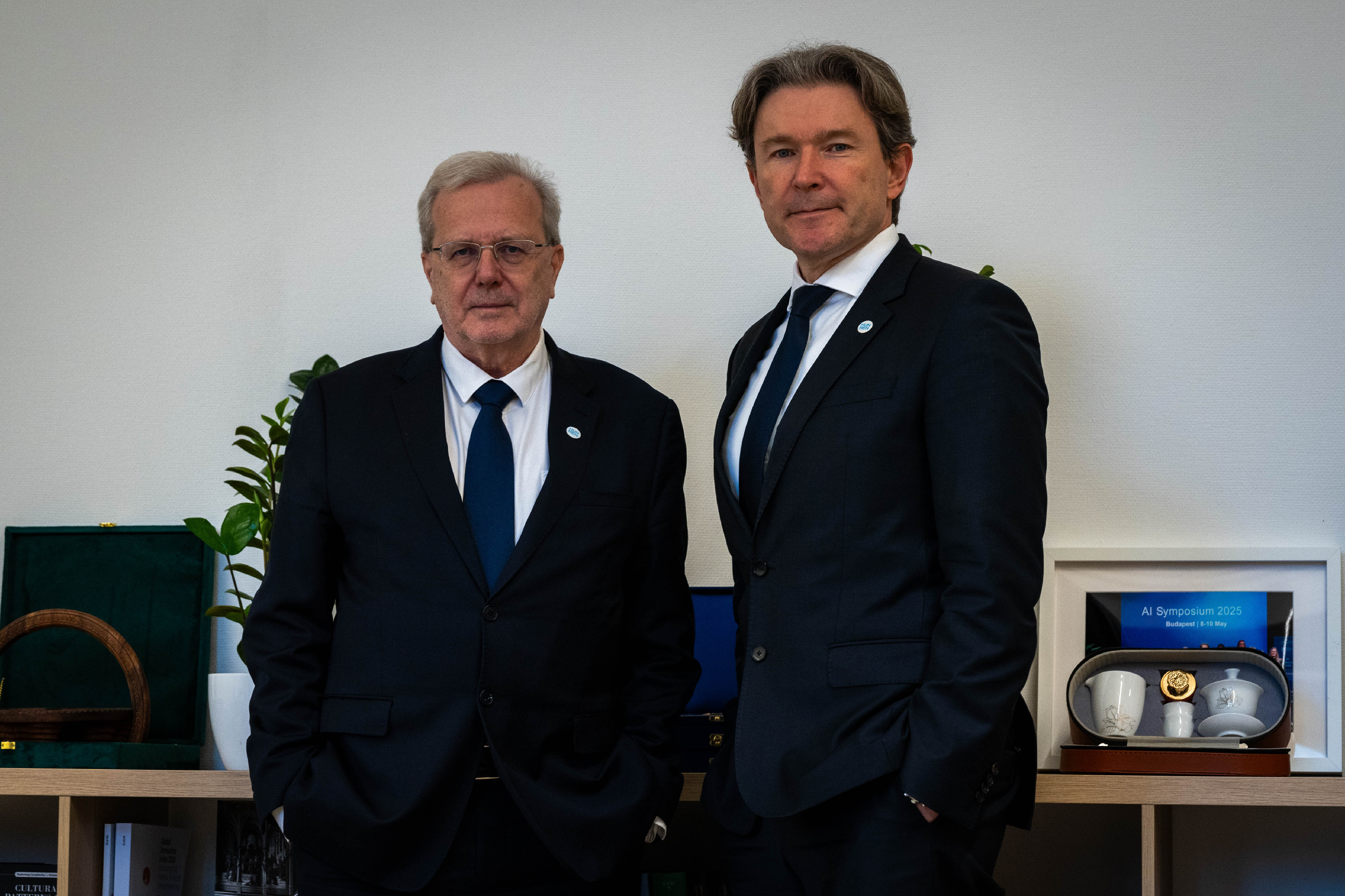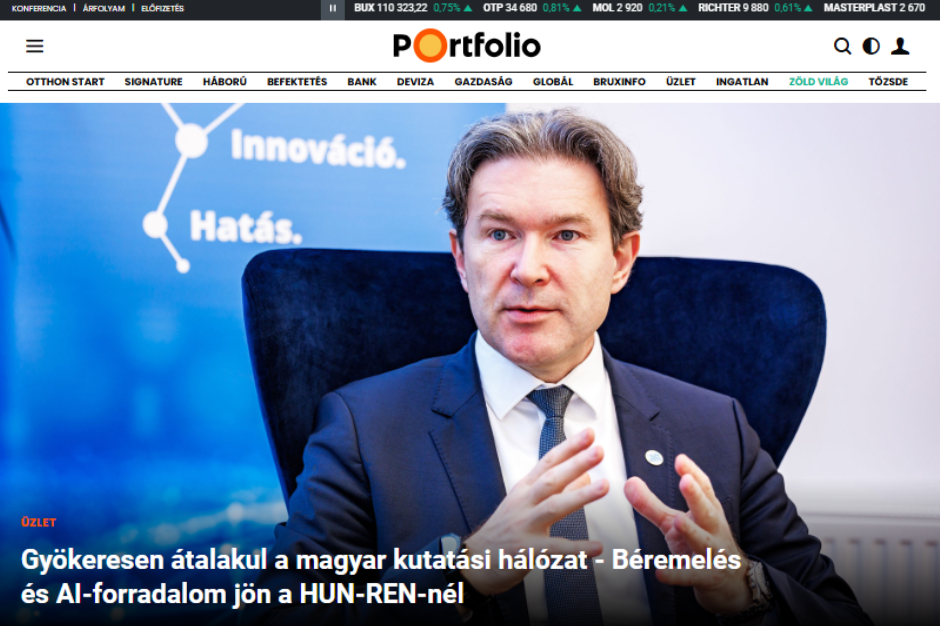Renewing HUN-REN: Cutting-Edge Research and Diverse Challenges "A historic opportunity for the renewal of research in Hungary"
The comprehensive assessment of HUN-REN research sites has shown that, while Hungary is home to cutting-edge research in many fields, its institutional network is not yet making efficient use of its resources and potential. Professor Péter Török, a distinguished member of the STEM Assessment Committee, Professor at Nanyang Technological University (NTU), Director of Imaging at the Singapore Centre for Environmental Life Sciences Engineering (SCELSE), Director of the NTU Optical Bio-Imaging Centre (NOBIC), and Interim Director of the Institute for Digital Molecular Analytics and Science shared his insights on the importance of HUN-REN's renewal.

Professor, you participated in evaluating the HUN-REN STEM research sites. What was your main personal impression?
Many institutes conduct world-renowned and impressive research, clearly reflected in the publications of their researchers. Their papers appear in prestigious scientific journals such as Nature, demonstrating the world-class quality of their work. These publications earn them global recognition.
Interestingly, however, only two per cent of published articles are based on collaboration between institutions, while the majority are the result of individual research, despite the ample scope for collaboration. There are plenty of common topics and research opportunities; yet even institutions working side by side are often unaware of each other's work.
It was particularly surprising and uplifting to witness the foresight of some leaders who are consciously preparing future generations for leadership roles and paying attention to how they nurture the next generation of leaders and researchers.
How did you perceive the reception of the evaluation by the research site leaders?
The Assessment Committees comprised highly regarded, internationally esteemed experts. President Balázs Gulyás clearly intended to conduct an evaluation based on the opinions of impartial and disinterested specialists. During the assessment, we were not given any specific instructions on what to write or what to look out for; the process was completely open. We were free to ask anything, with the sole aim of understanding how the institutions operate.
The reports resulting from the evaluation were sent back to the Directors and Directors-General of the institutions to seek their opinions and share the challenges identified and areas for improvement. Based on the information received so far, no one has received these reports with bad intent; I understand that the Directors recognised the value of the reports and deemed the underlying intention to be positive. When we compare the version we sent with the documents they reviewed, we find that no significant criticisms have been raised by the Directors regarding the report.
You mentioned the lack of collaboration. What other observations did the Assessment Committee you participated in make?
In addition to resolving HUN-REN's real estate property issues, it is important to highlight the issues of performance-based funding and administration. At present, an inordinate amount of researchers' time is taken up by administrative tasks, and most do not enjoy this aspect of their work. I believe it is essential for researchers that HUN-REN genuinely understands their concerns and does not merely offer superficial solutions.
Do you consider the current efforts to create a separate Act on legal status to be a good solution for addressing the issues mentioned above?
In my opinion, the most important consequence of resolving the legal status is the legislative assurance of researchers' recognition and the long-term funding of HUN-REN, as well as ensuring its political independence. I firmly believe that the efforts of the President and the leadership to achieve these goals are crucial. It is important to emphasise that this is not just about the organisational renewal of HUN-REN; it is the only viable way in terms of the success of research in Hungary, the recognition of researchers, and their salaries, which is perhaps even more important than HUN-REN's renewal.
In every country, the heart and fundamental building block of research are the researchers themselves. They must be given opportunities and freedom. The President emphasises at every opportunity that the freedom of researchers is sacrosanct.
It is also very important to be empowered by the government and the community of the country to carry out research, as it is essential to balance the needs of society and the economy with researchers' freedom.
Yes, and I can give you an example. In Singapore, basic research in almost every field has been publicly funded for the last twenty years. However, since Covid, about four years ago, the Singaporeans have decided that this approach is not sustainable. They now assert that while applying basic research is important, it is essential that research does not stop at producing a nice publication; it must also create value for the economy.
This approach is particularly relevant given Hungary's situation. Our country is not an economic giant like the US or Germany, where national income is high enough to cover practically all academic fields, be it basic or applied knowledge. Therefore, it is all the more important here to take the country's economic needs into account when funding research. There is no country in the world where this consideration is overlooked in research funding.
Based on the experience of the evaluations, are you optimistic about the prospects for real change?
I took part in the evaluation at the President's invitation because, for the first time since I left Hungary 34 years ago, I see a real opportunity for the renewal of Hungarian research. At last, there is a chance to make a genuine difference and to build a foundation that, alongside freedom, will provide researchers with what they desire most—opportunities and support.
In addition to providing opportunities, it is crucial to support researchers in achieving the goals they set for themselves. The Hungarian researchers I have met are remarkably talented and motivated; their own skills and dedication drive them forward. There is no need for concern, as Hungary’s extraordinary level of talent provides a solid foundation for successful research. However, this must be complemented by establishing the necessary organisational, legal, funding, and infrastructural frameworks.

